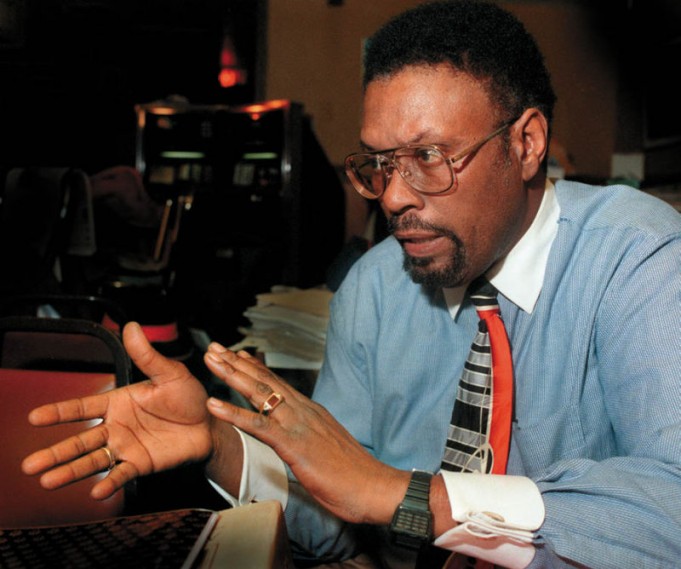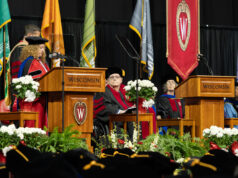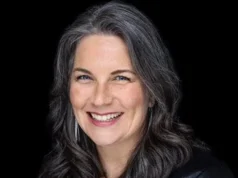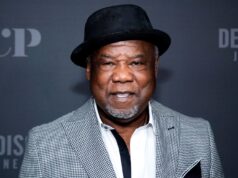To celebrate Black History Month, Madison365 will give three awards named in honor of local community leaders who left lasting legacies in Madison. The titles of these awards are being announced over the first three Mondays of the month, and the award winners will be announced in the last week of February. Last week we announced the Milt McPike Education Award. Today, we announce that the Eugene Parks Disruption Award will be given to member of the community who is exceptional at challenging the system and fighting for justice.
Long before the Race to Equity report and long before Madisonians suddenly discovered that their city had the worst racial disparities in the nation, there was a man named Eugene Parks who was talking about all of those issues (and more) to anybody who would listen. Parks was one of the first people to point out that there were, indeed, “two Madisons.”
“He was the forerunner of ‘Madison is a great city … but not for everybody. It needs to be a great city for everybody,’” Neil Heinen, longtime editorial director for WISC TV and Madison Magazine, tells Madison365.
“Gene took some chances that other people weren’t willing to take. He was willing to put his career at risk for what he believed in,” Heinen adds. “I would never say that he was right all the time; I wouldn’t say that about anybody. But when it came to the core issues of social justice and the quality of life of African Americans and for other citizens facing challenges in this city … he was a champion. He truly believed those issues were worth fighting for and worth introducing in almost every important civic conversation.”

As State Sen. Tammy Baldwin once said: “Eugene Parks was a complicated man who confronted complicated issues head on, no holds barred.” He vigorously fought against racial segregation and discrimination and was one of the first Madisonians who made its white residents look past the Farmers Markets, its Concerts on the Square, and its numerous nationwide accolades to the harsh realities that existed for people of color in Madison.
“Many of the things we are moving forward with today in the civil rights arena, Mr. Parks started and initiated long ago,” says Rev. David Hart, a Madison attorney, author, activist and pastor of Justice Church. “He was doing work in the City Council and battling mayors and fighting for us since the ‘60s.
“Eugene Parks was in many ways a prophet. He was very strategic. A brilliant man,” Hart adds. “People were hesitant to get close to him because he would always say the things that needed to be said … things everybody else was afraid to say.”
Parks was born in Madison on Apirl 7, 1947, and was raised in the Park Street corridor where he went to Madison-area schools. He was elected president of the State Association of Student Councils in 1963 before graduating from Madison La Follette High School in 1965. Parks ran unsuccessfully as a write-in candidate for Dane County Sheriff and later as a Democratic candidate for secretary of state.
He attended UW-Madison for two years before dropping out. In 1969, Parks was elected to the Madison Common Council becoming the first person of color in the history of the city or Dane County to be elected to public office.
From 1975-1979, Parks worked as an aide for State Sen. Monroe Swan and the president of the Madison NAACP. In 1979, he became an administrative assistant for Madison Fire Chief Ed Durkin. In the 1980s, Parks was the affirmative action officer for Mayor Joe Sensenbrenner.

As the city’s first African-American candidate for mayor, Parks lost mayoral contests in both 1989 and 1999.
Heinen remembers in 1988, when Parks made huge news in Madison by calling a Madison Area Technical College board member a “racist, liar and coward.”
“He was outspoken and he was unafraid to address any issue,” Heinen says. “When he saw issues of justice and equity emerging at the Madison Area Technical College board level, he would go and speak at an MATC board meeting and take these issues on head-on. He was seen as a lightning rod.”
That tirade against the MATC board member earned him a letter of reprimand from Mayor Joe Sensenbrenner. He was later suspended for 30 days and eventually fired. Sensenbrenner said the firing was performance-related, but many felt different.
A court later ruled that Parks had been fired illegally, without a Common Council vote; he was given a new civil service job in a traffic engineering department sign shop as well as a settlement of more than $400,000.
As editorial director for WISC, the CBS affiliate in Madison, Heinen got to know Parks really well over the quarter-century he estimates that they knew each other. Heinen also knew him from his days with the station as News Assignment Manager starting in 1987, and prior to that, as a reporter, anchor and assistant news director for WIBA AM and FM.
“What I really grew to love about Gene was having those one-on-one conversations where we would just sit and talk and we would really get deep about underlying issues he was having at the time,” Heinen says. “I can see why he chose the words that he chose when he walked into a mayor’s news conference to make a point and then later on he would talk about some of the underlying reasons for that.”
Hart had known and looked up to Parks since he was a little boy. “I grew up with his kids – Kendra, Reggie, and Stacey. We used to church together at St. Paul,” Hart says. “I remember Mr. Parks being larger than life then. A good soul. He was a good-hearted man. That’s what I remembered when I was young.

“When I was older, he really was my mentor. I would sit in his living room on the south side and just listen to him and his wisdom,” Hart adds. “Every time I saw him, his words to me was something to the effect of, ‘Don’t take my path. I have my own path and made my own way.’ He was looking for something different for me and for the people who came after him.”
For many, Parks was the anointed voice of the black community in Madison. A lot the reporters back in that day just went naturally to Parks for anything that had to do with African-American life.
“My relationship with Gene evolved from meeting with him and interviewing him as a reporter and a source relationship to at the end of his life, I really had deep affection for Gene. I thought he was a remarkable human being,” Heinen says. “He had some really deep honest vulnerabilities, but he was a successful man in a lot of ways.
“He was the first sort-of ‘stereotypical angry black man’ in Madison and it was intense,” Heinen adds. “But I thought it was really unfair. That is the worst stereotype. Gene was a big personality. He was a big man. He was a good communicator and he was demonstrative.”
Heinen said that Parks’ alleged “anger” would be something that people today would not necessarily interpret as anger. “It would be interpreted as passion and just part of his personality,” Heinen says.
“He was really comfortable out at our [WISC-TV] building. Gene and I had a good relationship,” Heinen adds. “He was comfortable being on my show. He liked doing editorials. I think he felt he could trust the way he would present his views … and I trusted him in return.”
“Even if some young people today in Madison don’t know what Eugene Parks did or who he was, we are all living within his legacy every time we march, every time we speak the truth to the political establishment, every time we question the things that are going on in the community … we are working within the framework of his legacy. Absolutely.”
Passionate, articulate, intelligent, in-your-face, loud, and proud, Parks was Young Gifted & Black (YGB) long before YGB was born.
“When Gene was a younger man, I’m sure he would have embraced the passion and the style of YGB’s mission and vision,” Heinen says. “If he was alive today, he would embrace it still but it would be tempered through his experience and knowledge of government and the people of this community. He knew everybody and he knew how things worked. I could see him guiding them. ‘Keep your passion; keep your ideals, keep your voice …. BUT, think about this.’
“Gene was part of the history of civil rights struggles in this city as a young man. That history is important,” Heinen adds. “Gene was always very respectful of the elders that came before him and knew of the contributions and efforts of some of the long, long-time African American families here in Madison.”
“I feel like there are remnants of Mr. Parks in [YGB leader] Brandi [Grayson]. I think he has really the conscious of black Madison,” Hart adds. “Even if some young people today in Madison don’t know what Eugene Parks did or who he was, we are all living within his legacy every time we march, every time we speak the truth to the political establishment, every time we question the things that are going on in the community … we are working within the framework of his legacy. Absolutely.”
Parks was very good at describing the everyday things he saw and what motivated him and what he stood for.
“He was about walking the talk and being a true and honest voice for the community he represented – and he lived and operated in a lot of different communities from the highest levels of city government to the everyday African American communities to the business community. He had so many relationships,” Heinen says.
When Parks died on Feb. 28, 2005, the community mourned a huge loss. He was only 57.
“Mr. Parks continues to live on in the memory and mind of many of us folks here in Madison. I hope that we do more to keep his legacy alive,” Hart says. “He spoke like an oracle. He was always three steps ahead of me. He would speak in a way that was prophetic. He was a very wise man and he had his own special way of imparting that wisdom.”










